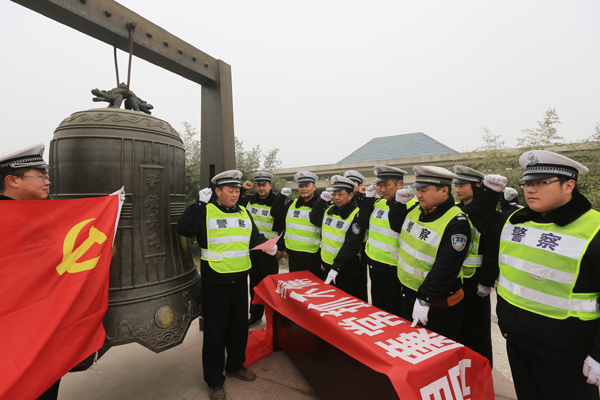 |
|
Police from Huaibei, Anhui province take an oath in front of a big bell in anwer to central goverment's efforts to fight against corruption. CHINA DAILY |
The government's anti-corruption campaign has been underway for two years now, and while many support the move, others complain that the process has taken too long and hasn't gone far enough, as Zhang Yan reports.
The fight against corruption has become a top priority for the central leadership, because it is key to China's future and the legitimacy of the government, according to leading experts.
At the ongoing two sessions, the annual meetings of the National People's Congress and the Chinese People's Political Consultative Committee, many delegates have spoken warmly of the achievements of the anti-corruption drive and the determination to build a clean government, but others admitted that they harbor reservations about the duration and efficacy of the campaign.
"After an anti-graft campaign lasting two years, I expect the Party to strengthen its efforts and conduct a persistent campaign to crack down on corruption," said Du Mei, a CPPCC member and deputy director of the Television Artists Association in the Inner Mongolia autonomous region. Du urged the government to strike a balance between fighting corruption and encouraging honest officials to perform their duties without fear of falling foul of the investigative teams.
"Given the intensity of the anti-graft campaign, some officials in my hometown are wary of discharging their responsibilities because they are afraid they may become targets too," she said.
Xiong Daijun, an NPC deputy and vice-president of the North University of China in Taiyuan, Shanxi province, was also skeptical: "Although some effective measures have been taken, I still doubt the government will establish a comprehensive mechanism - information gathering, supervision, and prevention - that will eradicate the problem of corruption."
Niu Dun, a CPPCC member and vice-minister at the Ministry of Agriculture, said, "The priority is to speed up the legislative process and run the county in accordance with the laws to eliminate corruption at the roots."
After taking office at the 18th Party Congress in November 2012, President Xi Jinping initiated a wide-ranging drive against graft that targeted both high-ranking "tigers" and lowly "flies."
Statistics from the CPC Central Commission for Discipline Inspection show that by January, as many as 63 officials at the ministerial or provincial level and higher were being investigated over allegations of "serious violations of discipline," a common euphemism for corruption.
Those under investigation include four powerful "tigers": Zhou Yongkang, the country's former chief of security; Xu Caihou, a PLA general and former vice-chairman of the Central Military Commission; Su Rong, former vice-chairman of the CPPCC's National Committee; and Ling Jihua, former minister of the United Front Work Department of the CPC Central Committee.
Some foreign media have also questioned the campaign, saying it has resulted in Party officials becoming reluctant to perform their duties and has led to a downturn in economic development. Some observers have said the campaign is nothing more than a purge of Xi's political rivals.
Chen Yong, an NPC deputy from Hong Kong who works in the financial sector, said: "Those (media) organizations have ulterior motives, and have deliberately distorted the truth. If China doesn't boost efforts to combat corruption, they will ask the government why it ignored serious graft and didn't take effective measures to cope with it." He added that the claims are politically driven, because the commentators are interfering in China's internal affairs and blame all failings on the country's political system.
Zhao Hongzhu, deputy head of the Central Commission for Discipline Inspection, the country's main corruption watchdog, said: " It's wrong for some people, overseas commentators in particular, to interpret China's anti-corruption campaign as an internal power struggle."
Related Stories